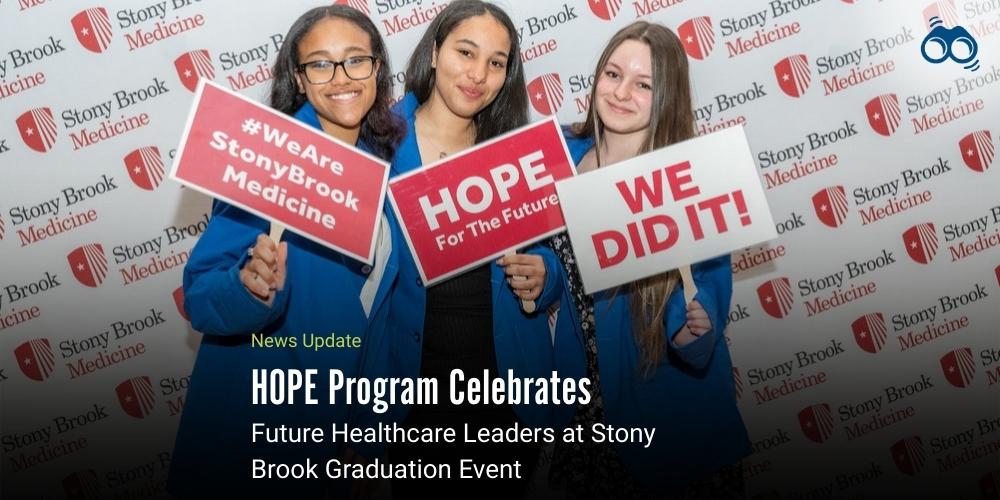Stony Brook’s HOPE Programme Empowers Future Healthcare Leaders
HOPE Programme Graduates Celebrate Milestones in Healthcare Education
Stony Brook Medicine celebrated the achievements of seventy-seven outstanding high school students during the 2025 Health Occupations Partnership for Excellence (HOPE) Program’s Moving-Up and Graduation Ceremony, held on 6 May at the Bauman Centre. The event marked a significant milestone for students who have shown exceptional dedication and excellence in healthcare-related studies, preparing them for future careers in the medical field.
The 2025 HOPE cohort, comprising 35 graduating seniors and 42 juniors, represented four partner school districts: Brentwood, Longwood, William Floyd, and Wyandanch. Designed to inspire and support students aspiring to healthcare professions, the HOPE Program offers hands-on learning experiences, mentorship, and exposure to various career pathways within the medical field. The ceremony celebrated the students' hard work and commitment, emphasising the importance of nurturing the next generation of healthcare professionals. Stony Brook Medicine shared that seven graduates of the HOPE Program would attend Stony Brook University this autumn, pursuing degrees in subjects like biology, health sciences, chemistry, and biomedical engineering, including one Simons STEM Scholar. Other graduates were set to join prestigious institutions such as Columbia, Barnard, St. John’s, Cornell, and the Army National Guard.
The event was attended by the students’ families, educators, and leaders from both Stony Brook University and Stony Brook Medicine. Judi Brown Clarke, Vice President for Equity and Inclusion, delivered opening remarks, praising the students’ dedication and encouraging them to pursue careers in health sciences. Keynote speaker Sylvia Diaz, Deputy County Executive for Health, Human Services and Education, and a Stony Brook alumna, stressed the crucial role of public health for those entering healthcare professions. The HOPE programme, which has been running since 2005, is a two-year initiative for high school juniors and seniors aspiring to careers in healthcare and medicine. Since its inception, it has supported nearly 300 students from underrepresented and underserved Long Island communities, helping them begin their college education.
During the ceremony, students shared their journeys through vision boards and six-word memoirs, which reflected their aspirations, growth, and resilience. These memoirs, displayed on stage during award presentations, captured the students' spirit of determination and gratitude. Notable examples included: “Fell, rose, grew, still reaching higher” by Farah Alzafarani, and “Their broken English, my fluent future” by Joel Espinoza. The HOPE programme is managed by the University and Hospital Community Relations Office, with student assistant Katie Hsu coordinating its activities for the past three years. Throughout the 2024-25 academic year, various departments and units from Stony Brook University and Stony Brook Medicine contributed to the programme by offering presentations, tours, and training sessions for students.
These included contributions from Senior Leadership, Admissions, the Career Center, Biomedical Engineering, Internal Medicine, and several other departments, such as the Alda Center, Pediatrics, Psychiatry, the Schools of Dental Medicine, Health Professions, Nursing, and Social Welfare, as well as the Division of Cardiothoracic Surgery, the Cancer Center, Radiology & Biomedical Informatics, Sports Medicine, the Simulation Lab, Stony Brook HOME Clinic, Stony Brook Volunteer Ambulance Corps, and the University Police Department. The HOPE programme continues to make a lasting impact, guiding and empowering students to pursue careers in healthcare while contributing to the development of future medical professionals.
Editor's Note:
The HOPE Programme at Stony Brook Medicine is a shining example of how targeted educational initiatives can create real change for students from underrepresented communities. By providing high school juniors and seniors with the tools, mentorship, and hands-on experience necessary for pursuing careers in healthcare, the programme plays a crucial role in shaping the next generation of medical professionals. The recent graduation ceremony highlights the dedication and perseverance of these students, whose stories of resilience and ambition should serve as an inspiration for all. It is commendable that institutions like Stony Brook are taking proactive steps to support diversity in healthcare, an industry often criticised for its lack of inclusivity.
According to Skoobuzz, the ongoing success of the HOPE programme is a testament to the importance of such initiatives in ensuring equal access to educational and career opportunities. This type of investment in future talent is exactly what is needed to not only broaden the healthcare workforce but also create a more equitable and effective system for all.














0 Comments (Please Login To Continue)